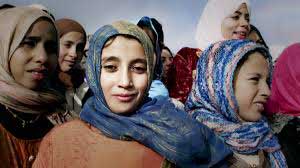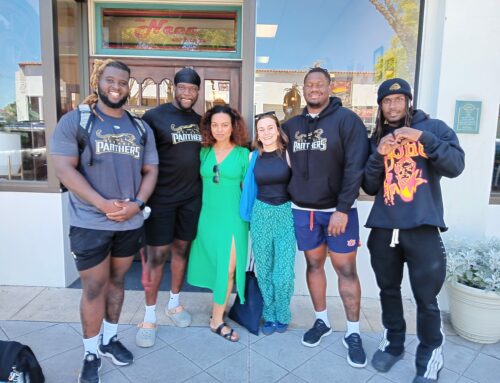Published in the March 4 – 17, 2015 issue of Morgan Hill Life
By Marty Cheek

The film documentary ‘Girl Rising’ played Feb. 21 at the Granada Theater, hosted by the Morgan Hill branch of the American Association of University Women. Photo courtesy girlrising.vhx.tv
Recently while shopping at Morgan Hill’s Trader Joe’s supermarket, I met a friend who introduced me to her 13-year-old daughter. I asked the girl what school she went to and if she had any favorite subjects in the classroom. She told me she didn’t. I asked her if she liked school, and she said she didn’t. Prodded more, she told me she thought academic learning was “boring.”
Typical American teenager reaction, you might say. And I would agree. And that’s a real shame. Considering that there are 62 million girls worldwide who would love to have that teenager’s opportunity at an education in a “boring” school, I found her lack of interest in learning disappointing. Because of various reasons involving economics and societal cultural values, these millions of girls can’t go to school. That puts their lives in peril.
I would love for my friend’s teenage daughter to meet Malala Yoesef, a girl from Pakistan who hungered for an education so much that she was willing to literally put her life on the line to get one. Her quest for an education became such a powerful drive in the young girl’s mind that she was willing to risk the violence of the Taliban, whose zealotry made them see educated females as a threat to their ideology.
Yoesef’s struggle for an education in Pakistan received worldwide attention when the New York Times published an article and an online video about her. Her name and face became well known in the struggle for girls education. But Yoesef’s story put her life in jeopardy. One day, she was riding in her school bus when two members of the Taliban stopped the vehicle on the road and boarded it and demanded to know “Who is Masala?” One of them pointed a Colt 45 pistol at the child’s head and fired point-blank three times. A bullet hit her and she was rushed to medical care.
Somehow, she survived. The incident only reinforced the question in the minds of millions of people around the world about why the Taliban finds educated girls such a threat that grown men are willing to murder them in cold blood.
Yoesef last year won the Nobel Peace Prize. She earned it for her courage to stand up against the Taliban and get an education. Her story would be well worthy of my friend’s daughter attention.
I would also love for my friend’s teenage daughter to watch the excellent documentary film “Girl Rising.” The Morgan Hill branch of the American Association of University Women wanted to point out the economic and social advantages of educating girls, and that’s why they hosted a screening of this movie at the Granada Theater Feb. 21 to an audience of mostly women and a number of girls in local schools.
“Girl Rising” spotlighted the stories of nine unforgettable girls born into cultures where educating girls is not a high priority. Among the stories was the one of Sokha, an orphan who spent many hours a day toiling in the garbage dump in Phnom Penh, Cambodia. Eventually, she broke free of this sad existence and found her way into a school where she became a star student and an accomplished dancer.
A girl named Suma in Nepal was forced by her family to endure a life of forced servitude to a “master” who abused her. Writing songs and dreaming of an education helped her to survive his neglect. She was freed from this slavery and now spends much of her time crusading to free other girls.
Other girls featured in “Girl Rising” spotlighted the social and economic conditions that imperiled girls in Peru, Haiti, Egypt, Sierre Leone, Afghanistan, Ethiopia and India.
Educating girls around the world is one of the smartest investments for America to make. It can build a stable world economy and society, thus potentially saving us billions of dollars in taxpayer money by minimizing the chances of conflict that can escalate into war. Educated girls mean that communities thrive and economies grow. And yet, we as a nation are missing out on this tremendous opportunity.
The problem is also a human rights issue because the girls worldwide who can’t go to classrooms have their quality of life put in jeopardy from prostitution, AIDs, early childhood marriage and health-threatening childhood pregnancies, slavery and other challenges.
From the film “Girl Rising,” the audience learned that educating girls can help break, in just one generation, the cycles of poverty that can devastate a developing nation. Educated girls grow up into women who stand up for their rights and become leaders in the communities. They marry and have children later in life. And they make sure their own children receive an education, thus perpetuating the cycle of economic growth for their families and their nations.
An education for girls empowers a culture to consider new ways of thinking about traditions and issues, and it helps in a transition of traditionally-held gender roles toward a more equal balance of power. Education promotes a higher level of critical-thinking skills, which is an absolute must for effective leadership and a movement toward democracy. An educated girl grows up into a woman who has the skills, information and self-confidence to be a good parent, employee and citizen.
And educating girls is essential to build a strong economy in a developing nation. One extra year of school can boost a girl’s future wages by 10 to 20 percent. According to the World Bank study of 100 countries, every 1 percent increase in young women receiving a secondary education boosted a country’s annual per capital income growth rate by about 0.3 percentage points. For a country such as India, this would mean a GDP increase of $5.5 billion.
My friend might want to sit down with her daughter and watch the film “Girl Rising.” Afterward, they can discuss why girls across America might want to better appreciate the education opportunities they enjoy in a land that boasts of its freedoms – including the freedom of a free public education. Perhaps it’s part of our American culture to not really care about education because most of our young people really face no real obstacles to going to school if they wish to go. Perhaps our female students need to be educated to the fact that they are damn lucky compared to millions of girls in nations where culture and economy don’t make educating them a high priority.







